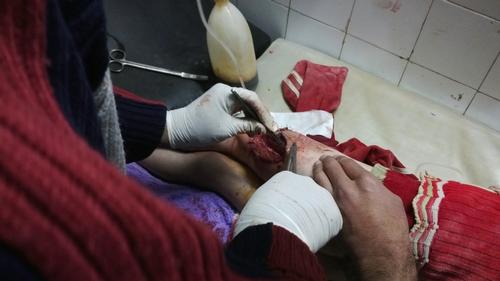After four years, the Syrian war remains as intense as ever and the need for emergency assistance becomes more urgent each passing day. But the fragmented and shifting frontlines, the sheer level of risk, and systematic blockades of international assistance have made it impossible for Médecins Sans Frontières (MSF) to provide hands-on emergency care in most parts of the country.
Because the needs are massive and still-growing, the organisation is working with Syrian doctors who have stayed and are determined to operate on wounded people, to deliver babies, and to provide emergency care to critically ill patients.
Over the past three years, MSF has developed a programme of large-scale support to underground and improvised healthcare facilities. More than 100 healthcare structures are supported both in government-held areas and in opposition-controlled zones – all locations where it is not possible for MSF teams to be physically present. Increasingly the programme is focusing on besieged areas, where little or no international aid reaches the doctors.
The blocking of access to areas under siege and bombardment, such as Ghouta and parts of Homs and Derra, is causing untold suffering. The military tactics of placing entire communities under siege means doctors struggle to keep any sort of medical activities running and frequently run out of essential drugs and medical supplies.
In Northern Homs, for example, approximately 350,000 people have been under siege for more than one year. MSF is supporting 8 field hospitals and 3 medical points in the North of Homs. Medical supplies can only reach North Homs after a perilous journey on dangerous and insecure roads full of checkpoints, where the probability of death, arrest and confiscation of material is high.
Even if it is available, many suppliers do not want to risk selling material like gauze or surgical threads when they know it is going to be sent into North Homs. Gauze is considered synonymous with war surgery, and often a supplier is not willing to take the risk of being arrested or shut down for supplying a besieged area. “It is precious, dangerous, incriminating. There are secret outlets supplying us with gauze.” (MSF-supported Doctor, Homs).
The field hospitals are providing the full range of services, but do so with severe limitations of equipment and staff. These services are crucial to thousands of civilians because they are trapped with no other options. “We were sending sick children and pregnant women to Homs National Hospital. But many of our patients never came back, so we stopped referring them.” (MSF-supported Doctor, Homs).
Almost all of the field hospitals supported by MSF in Homs and elsewhere in Syria have sustained damage from airstrikes and barrel bombs. “We work underground, literally. There are entire hospitals below the earth. The operating theatre is underground, as are the laboratory and the post-operative care room. Above ground we only keep patients who are stable and can be moved quickly to the basement when the shelling restarts”. (MSF-supported Doctor, Homs).
Today East Ghouta is the most populous besieged area in Syria, with population figures that range between 800,000 to 1,200,00 people. Starved, bombed and under siege, the population of East Ghouta is paying a shockingly high price. MSF supports 21 health facilities with up to 60 percent of their medicine and consumables. Earlier this year, one of these field hospitals received 128 patients after a crowded market was bombed. The medical team there was able to save 60 of the casualties, but 68 of their patients died and they used almost their entire stock of ER drugs and materials in that one day.
A recent bombing, on 5 March, on and around a primary school in a rural part of Idlib Governorate is a reminder that the violence is reaching all corners of the country. After the bombing, 50 wounded casualties were treated by the three nearest MSF supported facilities. These are not events that get widely reported in news headlines, but such events are happening with terrible regularity, and the health facilities, in rural as well as urban areas, are struggling to maintain even the most basic medical services.
The support programme run by MSF is large and complex, but is falling far short of meeting the overwhelming needs. These underground medical networks are a slender lifeline keeping hundreds of thousands of people alive – they must be supported in whatever way possible.
The following testimonies from doctors that MSF supports in Syria give a sense of the difficulties, but also their astonishing determination to keep saving lives even under these desperate conditions.



